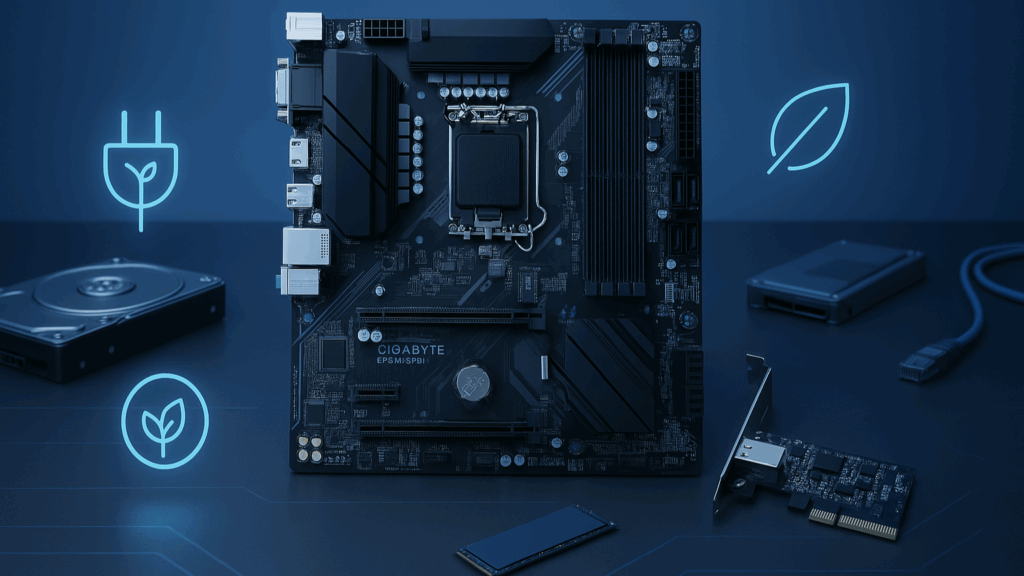When building the Cloudmaker, our DIY low-power NAS optimized for energy efficiency, expandability, and silent operation, one of the most critical decisions was selecting the motherboard. After evaluating a wide range of options, we landed on the GIGABYTE B760M DS3H — a modest Micro-ATX board that ticks more boxes than you might expect.
Here’s why this board became the heart of our Cloudmaker NAS — and what to keep in mind if you’re considering it for your own build.
Solid Foundation for a Budget NAS
The GIGABYTE B760M DS3H is based on Intel’s B760 chipset and supports 12th, 13th, and 14th Gen Intel Core processors. It provides a reliable platform without unnecessary extras, making it ideal for a clean, efficient NAS build.
Highlights include:
- Support for high-performance and energy-efficient CPUs
- Deep C-State support for minimal power consumption
- Plenty of storage options with 4× SATA3 and 2× NVMe slots
- Integrated 2.5 GbE networking
At under €100, it fits perfectly into a cost-conscious build while leaving room for customization and future upgrades.
Energy-Efficient CPU Compatibility
This board supports a wide range of Intel CPUs, from efficient i3 models to high-performance i9 processors. Thanks to BIOS support for 14th Gen Intel CPUs, it’s ready for future upgrades.
It also supports deep power-saving C-States, including C10, which allows the CPU to enter ultra-efficient idle modes. Many users have reported total system power draw under 9W at the wall1 when using 12th or 13th Gen i3 and i5 CPUs — an excellent result for 24/7 operation.
Another bonus: most supported CPUs include Quick Sync Video, enabling real-time hardware transcoding in media servers like Plex.
Storage and Networking Expansion
Despite its Micro-ATX form factor, the B760M DS3H offers ample room for upgrades:
- 1× PCIe x16 slot — perfect for an HBA like the LSI 9211-8i in IT mode
- 2× PCIe x1 slots — for network cards or other accessories
- 4× SATA3 ports — ideal for hard drives
- 2× M.2 NVMe slots — for fast SSD boot or cache drives
Even though SATA ports are limited, you can easily expand with an HBA card to support additional drives and full ZFS configurations.
Lean and Efficient Design
What sets this board apart is its minimalist approach — designed without unnecessary, power-hungry features:
- No onboard Wi-Fi — lower idle power and better compatibility with server OSes
- No RGB lighting — reduces power use and visual clutter
- No onboard audio or extra controllers — clean and efficient
- 4 DDR4 RAM slots — affordable memory options, including potential ECC (unofficial)
This lean design aligns perfectly with the Cloudmaker’s goal: build a silent, efficient system that just works.
Why It’s Perfect for the Cloudmaker
The Cloudmaker NAS was designed with four priorities in mind: silent operation, low idle power, expandability, and value. The B760M DS3H supports them all:
| Feature | How It Helps Cloudmaker |
|---|---|
| Low-power CPU support | Idle power under 10W with i3-14100 |
| PCIe expansion | Room for HBA and 10GbE cards |
| Dual NVMe slots | High-speed cache or mirrored boot drives |
| Compact Micro-ATX design | Fits into quiet cases like the Fractal Design Node 804 |
| DDR4 support | Uses widely available and affordable memory |
Conclusion
The GIGABYTE B760M DS3H may not include enterprise features like IPMI or validated ECC support, but it delivers an excellent foundation for a quiet, low-power, high-performance NAS. Whether you’re building a ZFS-based home server, Unraid system, or Proxmox lab, this board provides a surprising amount of flexibility and efficiency.
For the Cloudmaker, it struck the perfect balance between features, power savings, and price — and we’re confident it will serve your NAS build just as well.
🛠 Need help choosing components for your own NAS? Check out our Golden Builds or Hardware Recommendations for curated part lists and setup tips.
Cloudmaker Build

- https://forums.unraid.net/topic/156160-gigabyte-b760m-ds3h-ddr4-verschiedene-messungen-werte/page/8/#findComment-1563871 ↩︎


